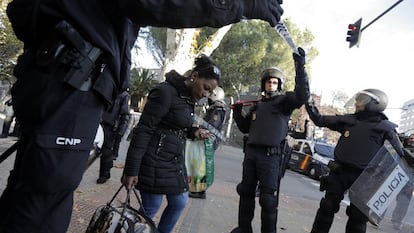Madrid police evict 350 squatters from abandoned student residence
Eighty arrested for “drugs and immigration” offenses during operation to clear famed dorm

Police arrested 80 people on Wednesday as they evicted 350 squatters from a landmark student residence at the capital’s Complutense University.
The San Juan Evangelista dorm was once famous for its jazz concerts and other cultural events in the waning years of Franco’s dictatorship and early days of Spain’s return to democracy. It was also the last place where renowned flamenco singer Camarón de la Isla performed before his death.
Since it was shut down in June 2014, the building had been gradually occupied by left-wing squatter groups, drug dealers, illegal immigrants and others
But the residence, known popularly as “El Johnny,” shut down in June 2014 following a series of building violations and management disagreements. After that, it was gradually occupied by left-wing squatter groups, drug dealers, illegal immigrants and other individuals who divided up the space by floors.
Most of the arrests were due to violation of immigration laws, the police said.
The police cleared the building after Complutense authorities filed a complaint over constant fights and loud noise coming from the former residence, which has over 400 rooms.
Students in nearby residences had also reported that the situation had become untenable, and that there was a feeling of insecurity in the area.
Inside the building, the police found several stolen bicycles from Madrid’s citywide rental service, marijuana plants, and 20 dogs.
The inside of the residence was rundown and covered in graffiti. Parts of it, including the library, had been turned into open bathrooms where the stench of urine was overpowering.
Fifty police vans participated in the raid. When it was over, around 50 people could be seen wandering aimlessly with their personal belongings in tow. Another 40 or so milled around the entrance of the Metropolitano subway station with pets such as dogs and guinea pigs, arguing among themselves.
Standing on the sidewalk with a blanket and a bicycle, Jorge, 43, explained that he knew the worst was coming when he heard the noise at 6am.
“We heard doors busted open and bangs and Paris came to mind,” he says. Later, a large contingent of police officers evacuated the building floor by floor, working their way down from the top.
Jorge has been here for a year, and he still remembers the early days when the squatters had plans to become an association, before everything got out of hand.
One squatter denied allegations of organized drug dealing and prostitution rings in the building
Pedro, another squatter who worked occasionally as a nightclub bouncer, says the fifth floor was the most troublesome one, with constant parties and fights that he linked to drug consumption.
But he denies allegations of organized drug dealing and prostitution rings in the building.
“So now what? Is [Madrid mayor] Manuela [Carmena] going to give me a house, too?” he asked.
Most of the former inhabitants of the San Juan Evangelista were hoping to be allowed back in to collect the remainder of their possessions. A police officer said that would not happen before Friday.
Complutense University president Carlos Andradas issued a statement shortly after news of the eviction broke, expressing his desire to reopen the former symbol of Madrid culture “as soon as possible” in order to preserve “its cultural legacy and turn it once more into a hub of the kind of culture, creativity, freedom and dialogue that helped enrich Madrid and Spanish society.”
English version by Susana Urra.
Tu suscripción se está usando en otro dispositivo
¿Quieres añadir otro usuario a tu suscripción?
Si continúas leyendo en este dispositivo, no se podrá leer en el otro.
FlechaTu suscripción se está usando en otro dispositivo y solo puedes acceder a EL PAÍS desde un dispositivo a la vez.
Si quieres compartir tu cuenta, cambia tu suscripción a la modalidad Premium, así podrás añadir otro usuario. Cada uno accederá con su propia cuenta de email, lo que os permitirá personalizar vuestra experiencia en EL PAÍS.
¿Tienes una suscripción de empresa? Accede aquí para contratar más cuentas.
En el caso de no saber quién está usando tu cuenta, te recomendamos cambiar tu contraseña aquí.
Si decides continuar compartiendo tu cuenta, este mensaje se mostrará en tu dispositivo y en el de la otra persona que está usando tu cuenta de forma indefinida, afectando a tu experiencia de lectura. Puedes consultar aquí los términos y condiciones de la suscripción digital.








































